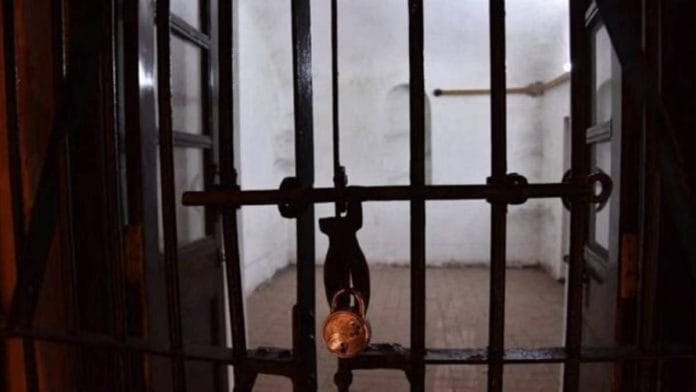New Delhi: Underlining that the grant of furlough is not an absolute legal right of the prisoner, the Delhi High Court Friday rejected a challenge to an order passed by the Director General, Prisons, in July, this year, denying furlough to a convict embroiled in a dowry death and cruelty case, on grounds that he was not eligible for it.
Furlough refers to the conditional release of a prisoner but only in cases of long term imprisonment, the division or two-judge bench noted while adding that it also differs from the closely related concept of “parole” which is conditional release but only in cases of short term imprisonment. The court also noted that while a specific reason is required for granting a prisoner parole, no such reason is required for furlough, which is in fact meant to break “the monotony of imprisonment”.
Refusing to interfere with the 23 July order, passed this year by DG Prisons, Delhi, a bench of Chief Justice Devendra Kumar Upadhyay and Tushar Rao Gedela dismissed the challenge and ruled, “Conceptually there is a lot of difference between parole and furlough including the difference in the purposes for which the parole and furlough are granted, and therefore, the plea by the petitioner that one year watch period in the instant case is unreasonable, appears to be misconceived.”
The July order had said that a prisoner, who has been readmitted to the prison, after being on furlough for a period of one year, which it dubbed as the “watching period”, may file an application for the grant of furlough but only after he completes one year, from the date of his readmission into the jail. It also relied on a standing order from 2019, to cite the convict’s illegibility for being released on furlough, saying that he could only apply in November 2025, after a period of one year had lapsed since his re-entry to the prison.
The ruling came on the plea of Deepak Srivastav, a man who was convicted by the sessions court in 2003, in a case of dowry death, criminal breach of trust, and cruelty under the Indian Penal Code, 1860. Subsequently, he was sentenced to undergo rigorous imprisonment for life. Finally, he moved the Delhi High Court, seeking suspension of his sentence. While the court allowed his plea for suspension of sentence, it rejected his challenge to the larger order of conviction in 2017, while he was temporarily released on bail.
Only a year later, he approached the SC, which suspended the duration of his sentence from life imprisonment to actual rigorous imprisonment for 10 years, while simultaneously refusing to set aside his conviction in October 2024. After this Srivastav surrendered, and was readmitted back to the prison. However, only a month later, he applied for furlough, and it was rejected, which led him to the Delhi HC to challenge the DG Prison’s order.
Although the court upheld the DG Prison’s order rejecting his furlough request, it made some important observations on the law concerning the grant of furlough, and parole, and how the two differ.
Difference between furlough and parole
Although both parole and furlough are conditional release, there is a difference. Parole is generally granted in case of short term imprisonment, whereas furlough is granted in case of long term imprisonment, the court noted in its 23-page ruling.
While specific reasons are required for grant of parole, furlough is meant for breaking the monotony of the imprisonment, the court said.
The court made these observations while relying on its 2021 ruling in State of Gujarat vs. Narayan, which stated that the right to furlough isn’t absolute and can be denied to the prisoner by a competent authority. In its 2021 ruling, the court had also mentioned how the duration of parole can be a maximum of one month, while the duration of furlough can only be up to two weeks. The former is granted by the Divisional Commissioner, while the latter is granted by the DG or DIG, Prisons, the court said.
Moreover, while parole can be granted a number of times, there are restrictions for furlough, the court said, adding that often, furlough can also be denied in the interest of society.
When can furlough be denied
Grant of furlough must be balanced against considerations like public interest, and can be denied to certain categories of prisoners like those convicted for sedition, terrorist activities and NDPS.
The court also pointed out furlough isn’t an absolute right. “Those prisoners whose presence in the society may be considered dangerous or prejudicial to public peace and order by the District Magistrate are also not eligible to be released on furlough. Even convicted foreigners are also not eligible to seek furlough,” the court said.
The court also noted that the grant of parole and furlough to prisoners emanates from Chapter XIX of the Delhi Prison Rules, 2018. Rules 1220 to 1243 relate to the grant of furlough, and the procedure for seeking the same.
In order to be eligible for furlough, the prisoner must fulfill certain criterion which are: He should be a citizen of India; should not be a habitual offender; should have exhibited good conduct in prison; and should have earned rewards in three annual good conduct reports or AGCRs.
Holding that the Director General of Prisons, under his general administrative and supervisory power of control over the affairs of the prison, can pass such an order, the court said that his decision required no interference.
“In the instant case, order of conviction of the petitioner has been upheld up to the Hon’ble Supreme Court and therefore, if by operation of any statutory rule or any statutory provision, furlough is being denied to the petitioner, it cannot be said that it shall amount to denial of right of liberty enjoyed by the petitioner,” the court said, while dismissing Srivastav’s claim that denial of furlough was a violation of his right to life under Article 21.






